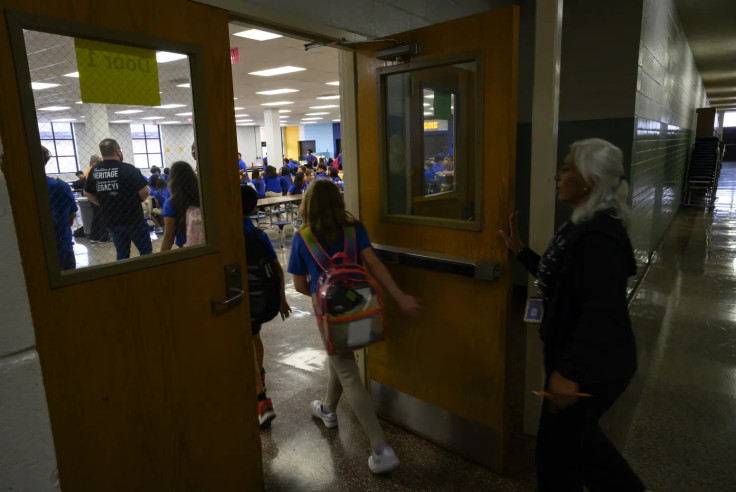
Even though migration has always had a dominant space in the U.S.'s public conversation, the continuously increasing amount of people making their way to the country's borders and more drastic stances from different political figures, especially within the Republican party, have led the issue to become ever-present.
Two recent examples of this are: the likely passing of SB 4 in Texas, a law allowing state police to arrest and potentially incarcerate undocumented migrants who come into the state; and statements by likely Republican presidential candidate Donald Trump, who recently said that "immigration is poisoning the blood of our country."
This is having lasting negative effects in the mental health of Latino families living in the U.S., especially among children and adolescents growing up amid this rhetoric. That is the conclusion of George Washington University professor Kathleen Roche.
Backed by multiple studies throughout the years, Roche's research suggests that, for this demographic, "political rhetoric or policies to deport immigrants can compromise mental health, result in poor grades, and increase substance abuse and social problems lasting into adulthood."
The Latin Times spoke with Roche to understand more about the issue in general, as well as particular aspects such as the impact of parents having different views about such sensitive issues, the effects of having a family member detained or deported and the discrimination of classmates, teachers or community members.
Roche explained that she has been studying the effects of "the immigration environment on U.S. Latino/a adolescents who live in a suburban area just north of Atlanta" since 2018 and that the research is ongoing.
So far, she said, evidence has shown her that "Latino teenagers report worrying about their future job and educational prospects because of the immigrant environment; avoid police or seeking medical care due to immigration threats; and report being warned by their parents to avoid authorities because of immigration authorities."
"Related to anti-immigrant rhetoric, our research shows that being discriminated against by teachers, classmates, and/or community members due to being Latino significantly predicts worse mental health and worse school performance over time," Roche said. She added that "actually experiencing the deportation or detention of a family member relates to a 2- to 3-fold higher risk of Latino/a adolescents' suicidal ideation, substance use, and clinically meaningful levels of outward-directed mental health problems such as aggression and conduct disorder."

Recent polling has shown that a growing amount of Latinos supports Donald Trump over president Joe Biden, even narrowing the gap to single digits in some key swing states. The trend has been moving steadily in this direction during the past years, going from 28% in 2016 to 36% in 2020, according to the Pew Research Center. In 2022, Republicans got 39 percent of the Latino vote, the highest percentage since 2004.
Asked about why he believed more Latinos were identifying as conservative in a recent Univision interview, Trump said: "It is a big honor because it has happened since I became President. They are entrepreneurial, energetic. Some of the best businesses are ran by Latinos. They want security too. They don't want people breaking into their houses. I think that is one of the reasons why they like me."
Consulted about the impact of children and teens potentially having different views than their parents' on sensitive, immigration-related issues, Roche said that when these cases take place "youth report increased conflict with their parent and, in turn, experience worse school performance."
"This phenomenon is known as a parent-child acculturation gap and it is not uncommon among today's Latino/a families because most of these youth are born in the U.S., but have at least one parents who was born outside of the U.S.", Roche added.
It's worth mentioning that Roche was not consulted specifically about Trump's statements, but his rhetoric regarding migration could pit parents planning to vote for him and children affected by it.
This is being felt regardless of whether teens are physically near the events. Roche explained that her research is focused in Atlanta and Washington D.C.'s metro area, and that three quarters of teens interviewed "during late 2018 and early 2019, just after the separation of families at the border during the prior summer, expressed negative outlooks for them and their families."
"They described feelings of fear and worry, limited opportunities for future success, and high levels of discrimination due to being Latino and/or from immigrant families," Roche said.
These vulnerabilities are compounded to other systemic disparities faced by Latino and Black students, according to a recent release of data by the U.S. Education Department from the 2020-2021 school year.
The findings, part of the Civil Rights Data Collection and reported by The Associated Press, underscore enduring inequities that impact students' academic success, college enrollment, and degree attainment.
According to the data, Black and Latino students encounter hurdles such as limited access to advanced classes, fewer certified teachers, and a scarcity of school counselors. In schools where less than half of the teachers meet state certification requirements, 66% of students are Black or Latino, highlighting a concerning trend.
The report emphasizes that the presence of certified teachers is crucial for better student outcomes, but a disproportionate number of Black and Latino students attend schools with lower percentages of certified teachers. A similar pattern is observed in the availability of school counselors, with students of color more likely to be in schools equipped with security staff but lacking counselors.
Access to higher-level classes is also disproportionally more challenging for Black and Latino students. The report reveals that these students are significantly less likely to enroll in Advanced Placement (AP) classes, which are known to enhance college prospects. The underrepresentation of Black and Latino students in AP science and math classes is largely unchanged since the 2017-18 school year.
© 2025 Latin Times. All rights reserved. Do not reproduce without permission.





